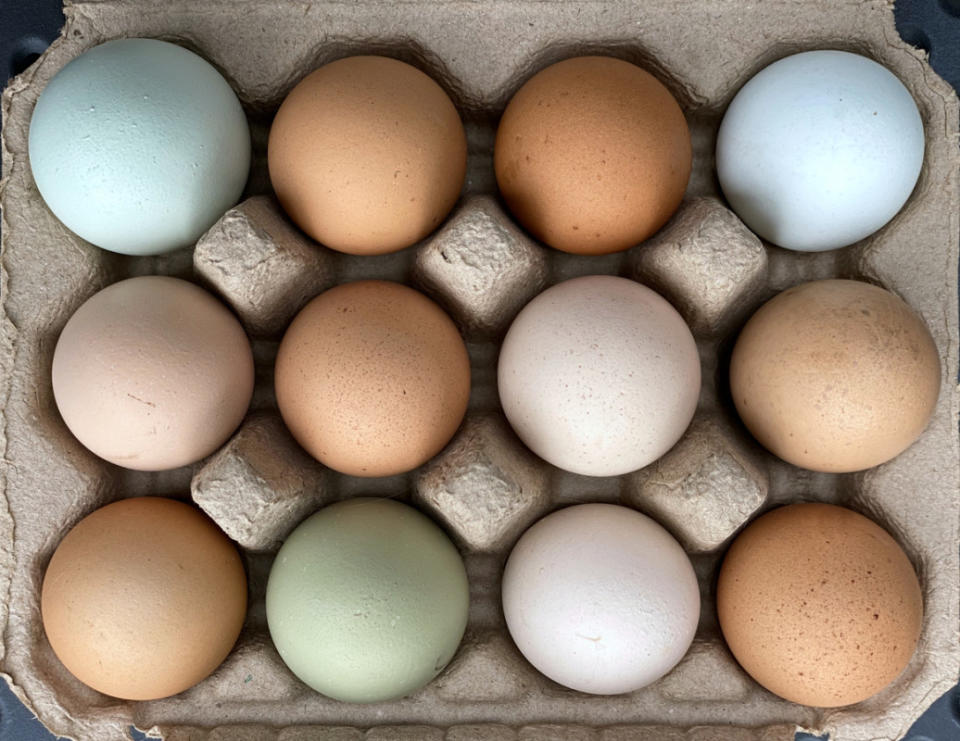Wait, Are Eggs Dairy?

Brown eggs in cartons
When I browse my grocery store’s app for my weekly shopping, eggs are listed under the dairy tab, along with yogurt and butter. But are eggs dairy?
Fruits, vegetables and meats have straightforward food classifications and designated areas of the grocery store, but eggs are a bit of a grey area for some grocery shoppers. Much of the confusion comes from eggs’ location in the supermarket. It’s like we were raised to think they’re dairy because they’re in the dairy aisle.
To get to the bottom of this mystery, we posed this question to two egg pros to get some insight into why eggs are (or aren't) considered dairy and why grocery stores sell them in that department.
Related: How Long Are Eggs Good After The Expiration Date?

iStock
Are eggs dairy?
Nope, eggs aren’t dairy products. As Dr. Mickey Rubin, vice president of research for The American Egg Board, points out, “dairy refers to milk derived from a cow or other domestic animal (such as a goat). Dairy products are products made from milk, such as cheese or yogurt.”
Since chickens aren’t mammals (the last I knew), their eggs aren’t considered a dairy product. But they sure do taste delicious with dairy products! I love a good egg casserole for breakfast. But I digress.
According to the U.S. Department of Agriculture (USDA), the Dairy Group only consists of milk, cheese, lactose-free milk, fortified soy milk and yogurt. To add more complexity, the USDA doesn’t count cream cheese, butter, cream and sour cream as dairy because of their low calcium and high fat levels.
Related: The Absolute Best Way to Peel Hard-Boiled Eggs
Are eggs dairy or poultry?
Eggs aren’t considered meat or dairy. Meat is defined as the flesh of animals, such as birds and mammals, used for food. Eggs belong to a special category—poultry, which is meat from domestic fowl, like chickens or turkey.
According to Lisa Steele, fifth-generation chicken keeper, blogger, cookbook author and television host, “eggs are a poultry product, they aren't technically meat. Unfertilized eggs will never turn into a chicken. So that's why vegetarians can eat eggs—although vegans have to steer clear because eggs, like honey, are produced by animals. Eggs are more accurately categorized as an alternative protein source, along with nuts, seeds and beans.”
Related: How Long Do Hard-Boiled Eggs Last?

iStock
Why are eggs in the dairy section?
Grocery stores include eggs in the dairy section for a few reasons, primarily to keep them and us safe. In 1970, Congress passed the Egg Products Inspection Action, which requires all egg products to be pasteurized to destroy salmonella. To protect the shell’s outer coating from bacteria, eggs in the US are required to be refrigerated at 40° or lower.
In the early days of grocery stores, deliveries from farms usually included milk and eggs and the tradition of selling them in the same section of the store continues to this day. Plus, if eggs are stored near raw meat, there’s the possibility of cross-contamination.
Dr. Rubin also notes, “It is likely that eggs are frequently grouped adjacent to dairy products in the refrigerated case at the grocery store for convenience, as these products are all considered household staples and require refrigeration.” This makes sense, especially when you think of baking or making breakfast. You’ll likely need milk and eggs.
Related: The Absolute Best Way to Make Soft, Creamy Scrambled Eggs, According to Legendary Chef Jacques Pépin
Why do people think eggs are dairy?
People associate eggs with dairy because of their spot in the grocery case. Lisa Steele notes that “until other types of eggs, like duck, goose, emu, ostrich and quail become popular enough in the United States to warrant eggs their own category and space at the grocery store, eggs will continue to be thought of as a dairy product.”
Are eggs vegetarian?
In short, eggs aren’t meat or dairy. Vegetarians can consume them but vegans can't. Eggs can be eaten on a dairy-free diet and are suitable for those who are lactose intolerant.
Related: Stop What You're Doing and Make the Viral Extra-Crispy Feta Fried Eggs
8 Fun Facts About Eggs
Now that we’ve established that eggs aren’t dairy, let’s learn a few surprising and useful facts about eggs, courtesy of Lisa Steele and Dr. Mickey Rubin.
More than 96 billion eggs are produced in the U.S. annually.
The hen’s ear lobe color determines the final eggshell color. For instance, hens with red feathers and ear lobes produce brown eggs.
Egg yolk colors are determined by the hen’s diet. Diets high in the carotenoids lutein and zeaxanthin, like corn, will produce eggs with yellow-orange or bright yellow yolks.
Eggs can have 7,000 to 17,000 tiny pores covering its shell. Pores are essentials for airflow for developing chicks.
Hens require 24-26 hours to lay an egg, and most are laid between 7am-11am. Eggs typically arrive at the store 48-72 hours after being laid.
Eggs are nutrient-dense and high in protein. For just 70 calories, one large egg contains six grams of high-quality protein, all nine essential amino acids, and six other essential vitamins and minerals.
The longer you cook an egg, the less nutrients it has; raw eggs contain more nutrients!
During her final culinary exam, chef Julia Child was stumped by a question about a soft-boiled egg, or oeufs mollets.
Sources:
Lisa Steele, 5th generation chicken keeper, founder of the Fresh Eggs Daily blog, author of The Fresh Eggs Daily Cookbook, and host of “Welcome to My Farm” on CreateTV and American Public Television
Dr. Mickey Rubin, Vice President of Research, The American Egg Board
Up next: Here's What Happens to Your Body if You Eat Eggs Every Day

